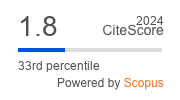Industry 4.0 Maturity Models to Support Smart Manufacturing Transformation: A Systematic Literature Review
Abstract
With increasing pressure to revitalize manufacturing industries with Smart Manufacturing capability within the Industry 4.0 (I4.0) context, companies have uneven readiness reflecting their gaps and barriers for transforming to the I4.0 state. Understanding factors and measuring a company’s maturity in addressing the I4.0 transformation is crucial to diagnose the company’s current condition and provide corresponding prescriptive action plan effectively. Despite the positive trend of maturity models for the industries, companies still face challenges with low I4.0 adoption rate. Designing a corresponding diagnostic framework into an intelligent maturity model will ultimately lead the company’s pathways toward the desired capabilities. In response, we systematically review and select the state-of-the-art research through a Systematic Literature Review (SLR) conduct to scrutinize the main characteristics of 14.0 Maturity Models. Subsequently, 35 exceptional articles published between 1980-2020 were selected for in-depth analysis of their structure, dimensions, and analytical features. Our analysis revealed the descriptive method have been widely used in many maturity models while few more-advanced prescriptive models design adopt fuzzy rule-base analytical hierarchy, knowledge based, Monte-Carlo methods, and even expert-system approaches. Furthermore, people, culture, organization, resources, information system, business processes, and smart technology, products and services have been treated as the popular evaluation dimensions which will define the state of an industry’s maturity level.
Downloads
References
Rittinghouse, J. W., & Ransome, J. F., “Cloud Computing Implementation, Management, and Security”, CRC Press, 2009.
Zhang, Y., Zhang, G., Wang, J., Sun, S., Si, S., & Yang, T. “Real-time information capturing and integration framework of the internet of manufacturing things”, International Journal of Computer Integrated Manufacturing, vol. 28, no. 8, pp. 811–822, 2005.
Zheng, P., wang, H., Sang, Z., Zhong, R. Y., Liu, Y., Liu, C., Mubarok, K., Yu, S., & Xu, X. “Smart manufacturing systems for Industry 4.0: Conceptual framework, scenarios, and future perspectives”, Frontiers of Mechanical Engineering, 2018.
Bueno, A., Godinho Filho, M., & Frank, A. G. “Smart production planning and control in the Industry 4.0 context: A systematic literature review”, Computers and Industrial Engineering, 2020.
Felch, V., Asdecker, B., & Sucky, E. “Maturity Models in the Age of Industry 4.0 – Do the Available Models Correspond to the Needs of Business Practice?”, Proceedings of the 52nd Hawaii International Conference on System Sciences, 2019.
Kagermann, Wahlster, W., & Helbig, J. “Recommendations for implementing the strategic initiative INDUSTRIE 4.0”, Final Report of the Industrie 4.0 WG, April. 2013.
Butt, Javaid. “Exploring the Interrelationship between Additive Manufacturing and Industry 4.0”, Design, 2020.
Mittal, S., Khan, M. A., Romero, D., & Wuest, T. “Smart manufacturing: Characteristics, technologies and enabling factors”, Proceedings of the Institution of Mechanical Engineers, Journal of Engineering Manufacture, 2017.
Davis, J., Edgar, T., Graybill, R., Korambath, P., Schott, B., Swink, D., Wang, J., & Wetzel, J. “Smart Manufacturing”, Annual Review of Chemical and Biomolecular Engineering, 2015.
Phuyal, S., Bista, D., & Bista, R. “Challenges, Opportunities and Future Directions of Smart Manufacturing: A State of Art Review”, Sustainable Futures, 2020.
Gottschalk, P. “Maturity levels for interoperability in digital government”, Government Information Quarterly, 2009.
Kazanjian, R. K., & Drazin, R. “An empirical test of a stage of growth progression model”, Management Science, 1989.
Lasrado, L. A., Vatrapu, R., & Andersen, K. N. “Maturity Models Development in IS Research: A Literature Review”, Proceedings of the 38th Information Systems Research Seminar in Scandinavia (IRIS 38), 2015.
Pöppelbuß, J., & Röglinger, M. “What makes a useful maturity model? A framework of general design principles for maturity models and its demonstration in business process management”, 19th European Conference on Information Systems (ECIS), 2011.
Lepenioti, K., Bousdekis, A., Apostolou, D., & Mentzas, G. “Prescriptive analytics: Literature review and research challenges”, International Journal of Information Management. 2020.
DuVarney, D. “Data analytics journey: where to start”, Baker Tilly. https://www.bakertilly.com/insights/data-analytics-journey-where-to-start, accessed 10th Dec 2020. 2020.
Moher, D., Liberati, A., Tetzlaff, J., & Altman, D. G. “Systematic Reviews and Meta-Analyses: The PRISMA Statement (Flow diagram)”, Annulas of Internal Medicine, 2009.
Caiado, R. G. G., Scavarda, L. F., Gavião, L. O., Ivson, P., Nascimento, D. L. de M., & Garza-Reyes, J. A. “A fuzzy rule-based industry 4.0 maturity model for operations and supply chain management”, International Journal of Production Economics. 2021.
Pierin Ramos, Luiz Felipe, et al. “An Analysis of Maturity Models and Current State Assessment of Organizations for Industry 4.0 Implementation”, Procedia Manufacturing, 2020.
Ryan, William Gerard, et al. “Recognizing Events 4.0: The Digital Maturity of Events”, International Journal of Event and Festival Management. 2020.
Moura, Luciano Raizer, and Holger Kohl. “Maturity Assessment in Industry 4.0 – A Comparative Analysis of Brazilian and German Companies”, Emerging Science Journal, 2020.
Bendi, Deepthi, et al. “An Off-Site Construction Readiness Maturity Model for the Indian Construction Sector”, Construction Innovation, 2020.
Lin, Tzu-Chieh, et al. “To Assess Smart Manufacturing Readiness by Maturity Model: A Case Study on Taiwan Enterprises.” International Journal of Computer Integrated Manufacturing. 2019.
Wagire, Aniruddha Anil, et al. “Development of Maturity Model for Assessing the Implementation of Industry 4.0: Learning from Theory and Practice”, Production Planning & Control, 2020.
Ellefsen, Anna Paula Tanajura, et al. “Striving for Excellence in AI Implementation: AI Maturity Model Framework and Preliminary Research Results”, Logforum, 2019.
Nemeth, Tanja, et al. “A Maturity Assessment Procedure Model for Realizing Knowledge-Based Maintenance Strategies in Smart Manufacturing Enterprises”, Procedia Manufacturing, 2019.
Benedetti, Miriam, et al. “Maturity-Based Approach for the Improvement of Energy Efficiency in Industrial Compressed Air Production and Use Systems”, Energy, vol. 186, 2019.
Sinnwell, Chantal, et al. “Maturity Model for Product Development Information”, Procedia CIRP, 2019.
Bertolini, Massimo, et al. “Maturity Models in Industrial Internet: A Review”, Procedia Manufacturing, 2019.
Werner-Lewandowska, Karolina, and Monika Kosacka-Olejnik. “Logistics 4.0 Maturity in Service Industry: Empirical Research Results”, Procedia Manufacturing, 2019.
Colli, M., et al. “A Maturity Assessment Approach for Conceiving Context-Specific Road-maps in the Industry 4.0 Era”, Annual Reviews in Control, 2019.
Gajsek, B., et al. “Using Maturity Model and Discrete-Event Simulation for Industry 4.0 Implementation”, International Journal of Simulation Modelling, 2019.
Nick, Gábor, et al. “Industry 4.0 Readiness in Hungary: Model, and the First Results in Connection to Data Application”, IFAC-PapersOnLine, 2019.
Schumacher, Andreas, et al. “A Maturity Model for Assessing Industry 4.0 Readiness and Maturity of Manufacturing Enterprises”, Procedia CIRP, 2016.
Maasouman, Mohammad Ali, and Kudret Demirli. “Development of a Lean Maturity Model for Operational Level Planning”, The International Journal of Advanced Manufacturing Technology, 2015.
O’Donovan, Peter, et al. “IAMM: A Maturity Model for Measuring Industrial Analytics Capabilities in Large-Scale Manufacturing Facilities”, International Journal of Prognostics and Health Management, 2020.
Alami, Oussama Marrouni, et al. “An Intelligent Project Management Maturity Model for Moroccan Engineering Companies”, Vikalpa: The Journal for Decision Makers, 2015.
Bititci, Umit S., et al. “Value of Maturity Models in Performance Measurement”, International Journal of Production Research, 2014.
Alvarez, Rodrigo L. P., et al. “Applying the Maturity Model Concept to the Servitization Process of Consumer Durables Companies in Brazil”, Journal of Manufacturing Technology Management, 2015.
Neff, Alexander A., et al. “Developing a Maturity Model for Service Systems in Heavy Equipment Manufacturing Enterprises”, Information & Management, 2014.
Hartono, Budi, et al. “An Empirically Verified Project Risk Maturity Model”, International Journal of Managing Projects in Business, 2014.
Yulistiawan, Bambang Saras, et al. “Maturity Model To Measure The Government Institutions Of Indonesia (The Environment Bureaucracy Of Education) In The Implementation Of E-Government”, Journal of Computer Science, 2014.
Ngai, E. W. T., et al. “Energy and Utility Management Maturity Model for Sustainable Manufacturing Process”, International Journal of Production Economics, 2013.
Pigosso, Daniela C. A., et al. “Ecodesign Maturity Model: A Management Framework to Support Ecodesign Implementation into Manufacturing Companies”, Journal of Cleaner Production, 2013.
Srai, Jagjit S., et al. “Understanding Sustainable Supply Network Capabilities of Multinationals: A Capability Maturity Model Approach”, Proceedings of the Institution of Mechanical Engineers, Part B: Journal of Engineering Manufacture, 2013.
Rapaccini, Mario, et al. “Service Development in Product-Service Systems: A Maturity Model”, The Service Industries Journal, 2013.
Haouzi, H. Bril El, et al. “Toward Adaptive Modelling & Simulation for IMS: The Adaptive Capability Maturity Model and Future Challenges”, IFAC Proceedings Volumes, 2013.
Meng, Xianhai, et al. “Maturity Model for Supply Chain Relationships in Construction”, Journal of Management in Engineering, 2011.
Krivograd, Nico, et al. “Development of an Intelligent Maturity Model-Tool for Business Process Management”, 2014 47th Hawaii International Conference on System Sciences, 2014.
Xirogiannis, George, and Michael Glykas. “Intelligent Modeling of E-Business Maturity”, Expert Systems with Applications. 2007.
Hammer, Michael. “The Process Audit”, Harvard Business Review, 2007.
Kemenperin. “Indonesia Industry 4.0 Readiness Index”, Kementrian Perindustrian Republik Indonesia, 2018.
Schuh, Günther, Anderl, R., Gausemeier, J., Hompel, M. ten, & Wahlster, W. “Industrie 4.0 Maturity Index - Managing the Digital Transformation of Companies”, Acatech Study, 2018.
IW, Consult. “Industrie 4.0-Readiness-Check”, IMPULS, RWTH Aachen. www.industrie40-readiness.de/?lang=en, 2021.
PricewaterhouseCoopers. “Industry 4.0 - Self Assessment.”, PricewaterhouseCoopers, i40-self-assessment.pwc.de/i40/ _landing, 2015
Leyh, C., Bley, K., Schäffer, T., & Bay, L. “The Application of the Maturity Model SIMMI 4.0 in Selected Enterprises”, AMCIS, 2017.
Akdil, Kartal & Ustundag, Alp & Cevikcan, Emre. “Maturity and Readiness Model for Industry 4.0”, Strategy, 2018.
Singapore Economic Development Board. “Frameworks & Tools”, SIRI, www.siri.gov.sg/frameworks-tools, 2020.
Weber, Christian, et al. “M2DDM – A Maturity Model for Data-Driven Manufacturing”, Procedia CIRP, 2017.
Copyright (c) 2023 Jurnal RESTI (Rekayasa Sistem dan Teknologi Informasi)

This work is licensed under a Creative Commons Attribution 4.0 International License.
Copyright in each article belongs to the author
- The author acknowledges that the RESTI Journal (System Engineering and Information Technology) is the first publisher to publish with a license Creative Commons Attribution 4.0 International License.
- Authors can enter writing separately, arrange the non-exclusive distribution of manuscripts that have been published in this journal into other versions (eg sent to the author's institutional repository, publication in a book, etc.), by acknowledging that the manuscript has been published for the first time in the RESTI (Rekayasa Sistem dan Teknologi Informasi) journal ;








